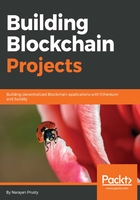
Decentralized governance and budgeting
To host a masternode, you need to have 1,000 Dashes and a static IP address. In the Dash network, both masternodes and miners earn Dashes. When a block is mined, 45% reward goes to the miner, 45% goes to the masternodes, and 10% is reserved for the budget system.
Masternodes enable decentralized governance and budgeting. Due to the decentralized governance and budgeting system, Dash is called a DAO because that's exactly what it is.
Masternodes in the network act like shareholders; that is, they have rights to take decisions regarding where the 10% Dash goes. This 10% Dash is usually used to funds other projects. Each masternode is given the ability to use one vote to approve a project.
Discussions on project proposals happen out of the network. But the voting happens in the network.
Masternodes can provide a possible solution to verify user identity in DApps; that is, masternodes can democratically select a node to verify user identity. The person or business behind this node can manually verify user documents. A part of this reward can also go to this node. If the node doesn't provide good service, then the masternodes can vote for a different node. This can be a fine solution to the decentralized identity issue.